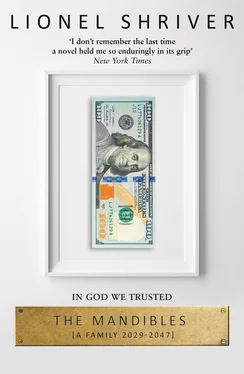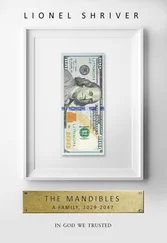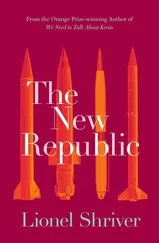1 ...8 9 10 12 13 14 ...20 Carter signed in at the office, whose Doric columns and classic New England white clapboard were meant to evoke a timelessness at odds with a clientele whose time was conspicuously running out.
“Your daddy gonna live forever, sí ?” the portly receptionist quipped, to which Carter responded distractedly, “Yeah, afraid so.” She shot him a look.
In truth, his natural impulse in encounters with strangers the last few days was to powwow over this “bancor” business and press them on what they presumed the game plan was in DC—since that’s what happened after 9/11, wasn’t it? All the social barriers fell, and you found yourself having heart-to-hearts with the clerk scanning your pretzels. We’re all in this together, that was the conceit. Except we weren’t all in this one together, and Carter stopped himself. A Lat minding the desk at an old folks’ home was just the sort to have floated obliviously through the crisis, perhaps blissfully unaware that there was a crisis: no assets.
Douglas and his hapless second wife were allotted a whole compound—the better to absorb a goodly share of the effects from their liquidated estate in Oyster Bay. (Carter accepted a claret-red leather sofa from the excess, which from the moment it arrived made all their other furniture look tattered. They’d unloaded it on Florence.) That was the concept at Wellcome: to reconstruct as best you could the home you’d left behind.
Accordingly, the front door was thick, wooden, and beveled, with a heavy brass knocker, as would befit the entrance of a grand house. A male orderly in whites answered wearing plastic gloves. “Just getting Luella changed.”
Chances were he was not referring to her outfit.
Carter padded the hallway’s plush crimson carpet. The baseboards and notched cornices were a lustrous mahogany, the doorways topped with finely latticed panes. The bathrooms gleamed with alabaster and gold-plated taps. Such opulence lavished on people during the one period of their lives they were least capable of enjoying it seemed subtly obscene. Besides, as much as he would have relished the luxury of no longer worrying about the size of his Con Ed bill, he was suspicious of luxury in its conventional sense. For Carter, extravagance backfired. Taken to the max, the many-splendored thing merely demonstrated the limits to how wonderful a given whatnot got. A toilet with a heated seat and electric lid-lift might flush with a discreet hush, but you still pissed in it. Brass or plastic, a doorknob was a doorknob. It opened the door. He had never understood what fixtures that cost hundreds of dollars apiece were supposed to make you feel other than hoodwinked.
Douglas’s appointments added a note of bygone class. The walls were decorated with framed dust jackets of novels by former clients. Through the French doors, the spacious library was lined floor-to-ceiling with literary properties Douglas would have sold to editors at auction, often for a great deal more money than the royalties they reaped. (If an author earned back his advance, went the Mandible Agency’s ruling maxim, the agent had failed.) Oddly, though the physical book had only in the last few years made a wholesale departure, the room exuded the ambience of a historical diorama from the eighteenth century. All the effort poured into each volume—not only the effort of composing the text, but of choosing the font, selecting the paper, styling the diamonds under the chapter headings, and designing the cover, down to the touchy-issue size of the author’s name—seemed both poignant and pathetic. But Carter resisted his father’s sentimentality over a mere format. It made no more sense to get maudlin over hardbacks than it did to burst into tears over a mottled box of floppy discs. His grandkids had no idea what a microfloppy was.
“See anything that interests you, you’re welcome to borrow it.” Douglas closed the French doors behind him. He’d changed into one of the cream-colored suits he favored all year, though today’s cravat was a seasonably autumnal rust. “But I’m fussy about my returns policy. Never did understand what about books makes people feel free to steal them. Casserole dishes, drat them, always come back.”
Carter turned from the shelves. “Reading is an act of possession. You read it, you own it.”
“So it seems! Most people assume what kiboshed publishing was the Stone Age. Suddenly nobody dared buy anything online anymore—”
“Actually, hackers had pretty much killed the online marketplace altogether way before the Stone Age—”
“—but supposedly readers had already made the leap to digital, and wouldn’t go back to the textual equivalent of the ox cart,” Douglas powered on; it was always fruitless to interrupt. “In truth, piracy had already brought the industry to its knees. Well before 2024, no one was buying books, in any form. The end of internet commerce was simply the coup de grace. What’s left to download may be plentiful and free, but it’s one big slush pile. Browsing is like falling into a sewer.”
Carter had heard this shtick. Douglas would be mortified to realize how often he repeated himself now. Never retelling anecdotes to the same parties was a point of pride.
“By the end of Shelf Life,” Carter said, “all Jayne made a profit on was the coffee. Watching Amazon go down in flames, I broke out marshmallows.”
“I never told you”—Douglas had told him—“but I lost a small fortune on Amazon. Call it trading with the enemy, but I was holding some serious stock.”
Reference to his father’s portfolio was awkward at the best of times. Carter didn’t want to seem too interested, but Douglas would never be persuaded by a contrived indifference. Carter had always to indulge the conceit that of course Pop’s investment decisions were none of his business—which was horseshit. While he and his sister saw eye to eye on little, they agreed on this much: their father’s unfettered day trading with their inheritance was worrisome. If Douglas seemed pretty together, they might only be alerted to the fact that he’d lost it by the discovery that he’d lost the money, too.
Douglas unstoppered a crystal decanter on the liquor cabinet. “Noah’s Mill?”
“Early for me. And I’m driving.”
“I thought nobody drives anymore, either.”
Carter accepted the bourbon he thought he’d declined. Given the visit’s agenda, he’d drain it. Driverless cars having virtually eliminated DWI, cops weren’t on the interstate prowl anymore. “Our BeEtle has a driverless function, but I don’t use it. I’m like you—a dinosaur.”
“To paleontology, then!” Clinking Carter’s cut-glass tumbler against his own, Douglas sank into a leather armchair by the window. Even five-inch tennis must have worn him out. “It was a splendid life while it lasted. At least Enola had a good run.”
“But Nollie refuses to write for nothing. Which means an esteemed novelist like my sister writes nothing.” Carter added unctuously, “Such a terrible waste.”
“As her former agent, I can only approve.”
“I never have sorted out how much she raked in,” Carter fished. “She didn’t have another bestseller after Better Late Than .”
“We’re all entitled to our financial privacy.” Not the most promising preface for their pending confrontation, and the short i in privacy was annoying.
“So how’s Luella?” Carter asked, though he didn’t care.
“Oh, same, same. In remarkably fine fettle, I’m told.” He sounded dismayed.
Leaving Carter’s mother, Mimi, at sixty for a thirty-eight-year-old assistant might have given Douglas a second lease on life, but in due course the joke was on him. Oh, Douglas and his floozy girl Friday had a good stretch together—or so Carter was informed, since Nollie buddied up to their father after the divorce, while for years Carter avoided the couple’s sumptuous new estate in Oyster Bay out of loyalty to their mother. But the willowy, elegant interloper—who was trendily Afri-merican to boot, which seemed to a liberal New York family like cheating—was stricken with dementia in her late fifties. Douglas kept the condition under wraps for years. But at length he came upon his second wife naked in the shower, a mechanism she didn’t know how to turn on and whose purpose escaped her. That proved unfortunate, since she was also smeared head-to-toe in a smelly, sticky brown substance she could no longer identify and was trying to eat. Were it not for Luella, Douglas might have lasted a lot longer on Long Island. An irony that Mimi never ceased to savor: when Douglas dropped a thirty-six-year marriage like a hot brick, his wife was running the Dementia Research Foundation, and at ninety-five she was still on the board—stubbornly of sound mind, if only for revenge.
Читать дальше












